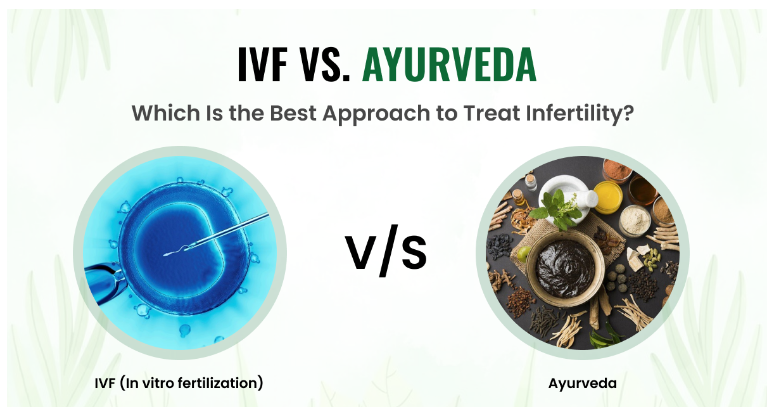
IVF vs Ayurveda
Understanding Infertility
Infertility is a medical condition in which couples are unable to conceive following a year of continuous unprotected sexual intercourse. In simple words, Infertility is a condition that makes a couple unable to get pregnant. Several factors including hormonal imbalances, structural causes, lifestyle habits, and aging are some of the causes of infertility. Female infertility treatment emphasizes solving these challenges using numerous natural and medical techniques
It’s important to understand infertility before we dive into treatment options. It’s a complicated problem with several causes, including:
Female factors: Ovulation disorders, fallopian tube blockage, uterine abnormalities.
Male factors: Low sperm count, poor sperm motility, abnormal sperm shape.
Combined factors: Both couples contribute to infertility.
IVF: A Modern Medical Solution
Challenges In IVF
- Miscarriage: The miscarriage rate for those who conceive using IVF with fresh embryos is higher. about 15% for pregnant people in their 20s to over 50% for those in their 40s. The rate increases with a person’s age. It is one of the biggest side effects of IVF.
- Ovarian hyperstimulation syndrome: This is a situation in which ovaries become painful. To induce ovulation, shots of fertility medications like human chorionic gonadotropin (HCG) may be the reason.
- Birth defects: The mother’s age is the primary risk factor for birth problems, no matter which method of conception. However, the use of IVF is linked with a slightly higher risk of a baby being born with heart issues, digestive, or other birth defects.
- Premature delivery and low birth weight: IVF gradually increases the risk that the baby will be born early or with a low birth weight.
- Side effects: Hormonal changes and physical discomfort are among the negative effects of the medications used in IVF.
- Emotional Stress: Because of the unpredictable outcomes, the process can lead to stress.
Why Ayurveda for Infertility?
Ayurveda is a traditional Indian system of medicine that prioritizes balance in the body, mind, and spirit. Ayurvedic infertility treatment emphasizes lifestyle adjustments, natural remedies, and holistic therapies to improve reproductive health. Ayurveda includes:
Herbal Supplements: Certain specific herbs, such as Guduchi, Shatavari, and Ashwagandha, are recognized to promote reproductive health.
Diet and Lifestyle: An appropriate diet, including exercise, and stress reduction are essential elements of female infertility treatment.
Panchakarma: The main motive of this detoxification process is to remove toxins from the body, which helps to enhance general health and fertility.
Benefits of Ayurveda for Infertility
• Natural and Holistic: Ayurveda provides a natural and complementary approach to reduce the possibility of negative effects.
• Boost Fertility and Reproductive System: Ayurveda fertility therapy, also known as “Garbh Sanskar”, offers a comprehensive approach that helps to enhance Fertility as well as reproductive health.
• Focus on Overall Health: The main aim of Ayurveda fertility therapy is to improve overall well-being, not just reproductive health.
• Personalized Treatment: Ayurveda offers customized plans for each patient, considering the person’s unique constitution and imbalances.
Understanding Garbh Sanskar
Garbh Sanskar is a traditional Ayurvedic technique in India, having the main goal of caring for and educating children while they are still in the womb. The term “Garbh” refers to a fetus, while “Sanskar” means nurturing and educational methods. Garbh Sanskar is a holistic approach to prenatal care, aiming to foster the physical, mental, and spiritual well-being of both the mother and her child. Apart from this, Garbh Sanskar also helps in managing the fertility issues in men and women.
IVF vs. Ayurveda for infertility: A Comparative Analysis
• Success Rates and Efficacy
The success of IVF can vary depending on numerous factors, including age and health conditions and other factors as well. If Ayurveda focuses on restoring balance and enhancing general health, its results may take longer to show positive outcomes.
• Cost Considerations
IVF treatments can be expensive, with costs adding up throughout several cycles. On the other hand, although Ayurveda for infertility treatments may take longer durations, it is a more cost-effective approach as compared to IVF.
• Side Effects and Risks
In IVF, Medical procedures are used, which can have some adverse effects, including ovarian hyperstimulation syndrome (OHSS). In contrast, Ayurvedic treatments are typically safer, and have potential risks, emphasizing natural cures and lifestyle modifications.
• Personal and Cultural Beliefs
Choosing between IVF and Ayurveda may depend on personal choice and belief, cultural backgrounds, and comfort levels. While some may prefer the scientific and controlled atmosphere of in vitro fertilization or IVF, most individuals give more preference to the holistic and natural approach of Ayurveda for enhancing fertility as they think it is the best approach to treat infertility.
Consulting an Ayurvedic Doctor for Infertility
For those who are considering Ayurveda for infertility, consulting an Ayurvedic doctor for infertility is essential. Ayurvedic doctors can offer customized treatment plans for infertility, dietary adjustments, and lifestyle recommendations based to meet each person’s unique requirements. HiiMS hospital provides a complete approach to treating infertility issues as the doctors and specialties are well-qualified and experienced and are always available to take care of their patients.
Conclusion: Finding the Best Approach to Treat Infertility
In this blog, we can see that infertility has become a major issue among couples, however, with the help of IVF and Ayurveda, one can boost fertility. Although both approaches are useful for infertility, the best approach to treat infertility is Ayurveda as it has no side effects, and is pocket-friendly as everyone can go with this method without thinking about the cost, higher-success rate, and, provides a holistic, natural approach that focuses on overall well-being and balance.
FAQs
What are the common causes of infertility?
There are some common causes of infertility including hormonal imbalances, structural issues, and lifestyle factors.
How does the Ayurveda approach treat infertility?
Ayurveda treats infertility by balancing the body’s doshas and improving overall health through diet, lifestyle changes, and herbal remedies.
What are the potential risks of IVF?
Through IVF some potential risks can include multiple pregnancies and ovarian hyperstimulation syndrome.
How does age affect fertility and the success of IVF?
Fertility decreases with age, and IVF success rates also decline, especially after age 35.
What lifestyle changes can enhance fertility according to Ayurveda?
Ayurveda focuses on a healthy lifestyle such as regular exercise, adequate sleep, stress management, and avoiding alcohol.
What is the role of Panchakarma in treating infertility?
It is a detoxification process in Ayurveda that can help cleanse the body, balance the three doshas, and improve fertility.
